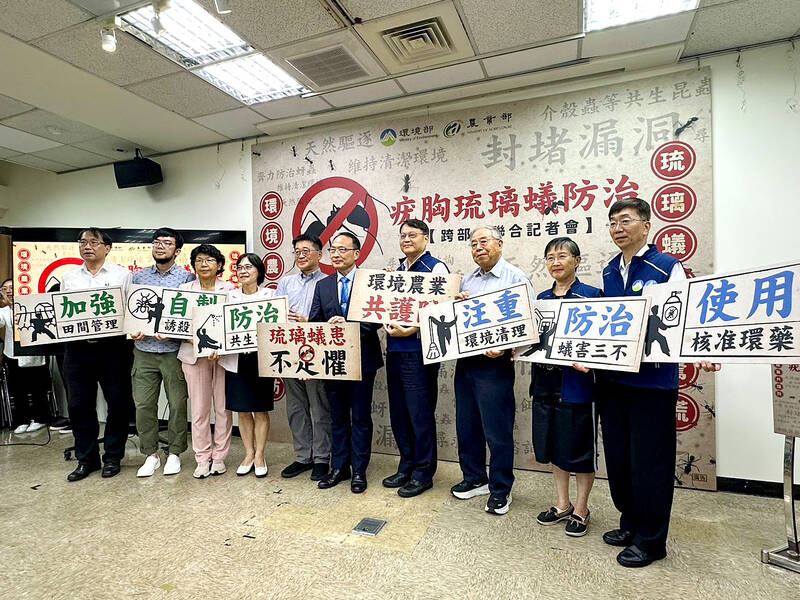Environmental cleanup should be prioritized over physical or chemical control methods in curbing the invasion of black cocoa ants at home or in fields, environment officials said yesterday.
The Ministry of Agriculture and the Ministry of Environment (MOENV) yesterday jointly held a news conference to publicize countermeasures against the proliferation of black cocoa ants.
Animal and Plant Health Inspection Agency Deputy Director-

Photo: Yang Yuan-ting, Taipei Times
General Hsu Jung-pin (徐榮彬) said that black cocoa ants, or dolichoderus thoracicus, are not considered agricultural vermin, as they do not cause damage to crops, despite being a nuisance in farmlands or neighborhoods.
Toxic and Chemical Substances Bureau Director-General Hsieh Yein-rui (謝燕儒) said that ready-for-use toxic baits are already available on the market, but environmental hygiene should be prioritized based on the principle of prevention.
People are also advised to seek professional help from pest control service providers, most of which have shifted to physical control methods — which are safer than chemical approaches — while environmental agents approved by the MOENV should be the last resort, he said.
Agency Deputy Director-General Du Li-hua (杜麗華) said that farm environmental management is crucial, as land used for extensive agriculture or unmanaged farmland are usually covered with fallen leaves, dead branches, bamboo rods or water pipes that are prone to becoming nests of black cocoa ants.
Given that ants gravitate toward sweetness, split fruits should be cut off and branches with sooty mold should also be removed, she said.
There are nine toxic baits applicable to black cocoa ants, with 81 bait products on the market for agricultural workers to use in serious cases, Du said, adding that bait must not be sprayed on crops.
Events would be held in affected areas by the end of next month to educate the public about how to prevent and control black cocoa ants in fields and at home, she added.
National Changhua University of Education biology professor Lin Chung-chi (林宗岐) said that he received reports on proliferating black cocoa ants in central and southern Taiwan about 10 years ago, although the invasive ants entered Taiwan more than two centuries ago.
Research showed that the proliferation is related to a non-native lineage from Vietnam that caused more infestations, he said.
Black cocoa ants are highly mobile and can form colonies with multiple nests, Lin said, adding that a mature “supercolony” could consist of tens of millions of ants.
Although they tend to dwell in bamboo forests or orchards in low-elevation areas in central, southern or eastern Taiwan, the ants have been found to be moving northward and have entered human areas, such as schools, temples and homes, he said.

The manufacture of the remaining 28 M1A2T Abrams tanks Taiwan purchased from the US has recently been completed, and they are expected to be delivered within the next one to two months, a source said yesterday. The Ministry of National Defense is arranging cargo ships to transport the tanks to Taiwan as soon as possible, said the source, who is familiar with the matter. The estimated arrival time ranges from late this month to early next month, the source said. The 28 Abrams tanks make up the third and final batch of a total of 108 tanks, valued at about NT$40.5 billion

Two Taiwanese prosecutors were questioned by Chinese security personnel at their hotel during a trip to China’s Henan Province this month, the Mainland Affairs Council (MAC) said yesterday. The officers had personal information on the prosecutors, including “when they were assigned to their posts, their work locations and job titles,” MAC Deputy Minister and spokesman Liang Wen-chieh (梁文傑) said. On top of asking about their agencies and positions, the officers also questioned the prosecutors about the Cross-Strait Joint Crime-Fighting and Judicial Mutual Assistance Agreement, a pact that serves as the framework for Taiwan-China cooperation on combating crime and providing judicial assistance, Liang

A group from the Taiwanese Designers in Australia association yesterday represented Taiwan at the Midsumma Pride March in Melbourne. The march, held in the St. Kilda suburb, is the city’s largest LGBTQIA+ parade and the flagship event of the annual Midsumma Festival. It attracted more than 45,000 spectators who supported the 400 groups and 10,000 marchers that participated this year, the association said. Taiwanese Designers said they organized a team to march for Taiwan this year, joining politicians, government agencies, professionals and community organizations in showing support for LGBTQIA+ people and diverse communities. As the first country in Asia to legalize same-sex

MOTIVES QUESTIONED The PLA considers Xi’s policies toward Taiwan to be driven by personal considerations rather than military assessment, the Epoch Times reports Chinese President Xi Jinping’s (習近平) latest purge of the Chinese People’s Liberation Army (PLA) leadership might have been prompted by the military’s opposition to plans of invading Taiwan, the Epoch Times said. The Chinese military opposes waging war against Taiwan by a large consensus, putting it at odds with Xi’s vision, the Falun Gong-affiliated daily said in a report on Thursday, citing anonymous sources with insight into the PLA’s inner workings. The opposition is not the opinion of a few generals, but a widely shared view among the PLA cadre, the Epoch Times cited them as saying. “Chinese forces know full well that